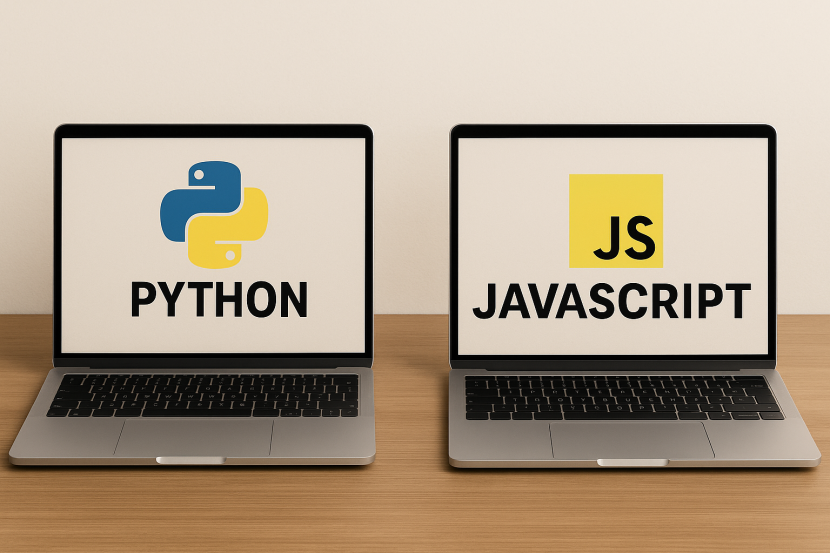Want to start coding but don’t know where? Don’t worry, you’re not the only one. Among the most frequently asked questions for beginners is:
Should I learn JavaScript or Python first?
Both languages are easy to learn, highly versatile, and used by the entire tech sector. This blog post deconstructs the advantages, disadvantages, and applications of each to enable you to make the right choice.
What is Python?
Python is an interpreted, high-level programming language with clean syntax and readability. Guido van Rossum developed Python in 1991, and it has since become one of the world’s most widely used languages—particularly for backend development, data analysis, and automation.
Why Learn Python First?
- Simple, clean syntax—perfect for beginners
- Vast library support—Pandas, NumPy, Scikit-learn, OpenCV, etc.
- Used in multiple domains—from web apps to machine learning
- Strong community—tons of tutorials, forums, and open-source tools
- High demand in data science & AI—one of the most sought-after skills today
Real-World Applications of Python
- Web Development: Frameworks like Django and Flask power scalable apps like Instagram and Pinterest.
- Data Science & Machine Learning: Libraries like TensorFlow, Keras, and Scikit-learn make it ideal for ML and AI.
- Automation & Scripting: Used for building bots, automating tasks, and scraping data.
- Cybersecurity: Often used in penetration testing and security automation.
- Game Development: With libraries like Pygame for simple 2D games.
📘 Learn Python: Python Official Docs
What is JavaScript?
JavaScript is the backbone of interactive websites. Initially developed for front-end development (making websites interactive in the browser), JavaScript has grown into a full-stack language thanks to tools like Node.js.
Why Learn JavaScript First?
- Ubiquitous in web development—runs natively in all browsers
- Full-stack capabilities—front-end + back-end with Node.js
- Huge ecosystem—React, Angular, Vue, Express, MongoDB, etc.
- Popular for startups and freelancing—fast prototyping and deployment
- Job-ready skill—97% of websites use JavaScript on the client-side
Real-World Applications of JavaScript
- Front-End Web Development: Frameworks like React.js and Angular are industry standards.
- Back-End Web Development: Node.js enables building APIs and server-side logic.
- Mobile App Development: Tools like React Native allow building apps for iOS and Android using JavaScript.
- Game Development: Create browser-based games using Phaser or Three.js.
- Progressive Web Apps (PWAs): Apps that work offline and behave like native apps.
📘 Learn JavaScript: JavaScript Guide – MDN
Python vs JavaScript: Quick Comparison Table
| Feature | Python | JavaScript |
|---|---|---|
| Ease of Learning | Very easy for beginners | Moderate (some quirks in syntax) |
| Syntax | Clean, readable, English-like | Curly-brace and semi-colon heavy |
| Use Cases | Data science, AI, scripting, web | Web development, mobile, full-stack |
| Speed | Slower execution time | Faster (especially in browsers) |
| Community Support | Massive (especially in academia) | Massive (especially for developers) |
| Career Roles | Data Scientist, Python Developer | Web Developer, Full-Stack Engineer |
| Frameworks | Django, Flask, Pandas, TensorFlow | React, Vue, Angular, Node.js |
| Best For | Automation, Data, AI | Front-end & full-stack development |
Career Opportunities
Go with Python if you want to be a:
- Data Scientist
- AI/ML Engineer
- Backend Developer
- Automation Specialist
- DevOps Engineer
Choose JavaScript if you’re aiming for:
- Front-End Developer
- Full-Stack Web Developer
- Mobile App Developer
- UI/UX Developer
- Freelance Web Consultant
Final Verdict
So, which should you learn first in the Python vs JavaScript debate?
- Choose Python if you love data, automation, AI, or want a simple entry point.
- Choose JavaScript if you’re excited about building interactive websites, mobile apps, or want to freelance fast.
🚀 Tip: Many developers start with one and eventually learn both for a full-stack edge!




